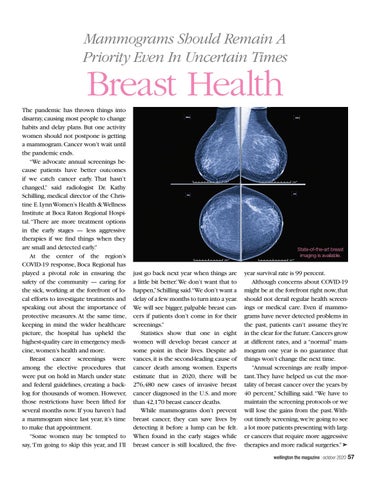Mammograms Should Remain A Priority Even In Uncertain Times
Breast Health
The pandemic has thrown things into disarray, causing most people to change habits and delay plans. But one activity women should not postpone is getting a mammogram. Cancer won’t wait until the pandemic ends. “We advocate annual screenings because patients have better outcomes if we catch cancer early. That hasn’t changed,” said radiologist Dr. Kathy Schilling, medical director of the Christine E. Lynn Women’s Health & Wellness Institute at Boca Raton Regional Hospital. “There are more treatment options in the early stages — less aggressive therapies if we find things when they are small and detected early.” At the center of the region’s COVID-19 response, Boca Regional has played a pivotal role in ensuring the safety of the community — caring for the sick, working at the forefront of local efforts to investigate treatments and speaking out about the importance of protective measures. At the same time, keeping in mind the wider healthcare picture, the hospital has upheld the highest-quality care in emergency medicine, women’s health and more. Breast cancer screenings were among the elective procedures that were put on hold in March under state and federal guidelines, creating a backlog for thousands of women. However, those restrictions have been lifted for several months now. If you haven’t had a mammogram since last year, it’s time to make that appointment. “Some women may be tempted to say, ‘I’m going to skip this year, and I’ll
State-of-the-art breast imaging is available.
just go back next year when things are a little bit better.’ We don’t want that to happen,” Schilling said.“We don’t want a delay of a few months to turn into a year. We will see bigger, palpable breast cancers if patients don’t come in for their screenings.” Statistics show that one in eight women will develop breast cancer at some point in their lives. Despite advances, it is the second-leading cause of cancer death among women. Experts estimate that in 2020, there will be 276,480 new cases of invasive breast cancer diagnosed in the U.S. and more than 42,170 breast cancer deaths. While mammograms don’t prevent breast cancer, they can save lives by detecting it before a lump can be felt. When found in the early stages while breast cancer is still localized, the five-
year survival rate is 99 percent. Although concerns about COVID-19 might be at the forefront right now, that should not derail regular health screenings or medical care. Even if mammograms have never detected problems in the past, patients can’t assume they’re in the clear for the future. Cancers grow at different rates, and a “normal” mammogram one year is no guarantee that things won’t change the next time. “Annual screenings are really important. They have helped us cut the mortality of breast cancer over the years by 40 percent,” Schilling said. “We have to maintain the screening protocols or we will lose the gains from the past. Without timely screening, we’re going to see a lot more patients presenting with larger cancers that require more aggressive therapies and more radical surgeries.” wellington the magazine | october 2020
57
